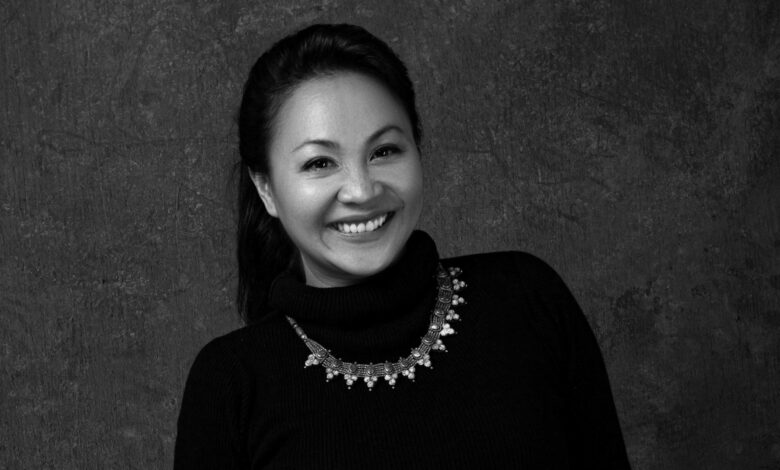Riva Jalipa: we must fight to finance our rights

Riva Jalipa is a Researcher and Adviser in Amnesty International’s Economic and Social Justice team leading our work on financing for human rights.
Spurred on by the progress she has seen in civil society activism in Kenya over 15 years of advocacy, she is a firm believer that change can happen and that everyone has a part to play.
Following the Fourth Financing for Development Conference in Seville in July 2025, Riva makes the urgent case for reforming global financial systems, reparative justice and economic and fiscal sovereignty for low-income countries.
My dad was a humanitarian doctor, so I was born where he was working at the time, which happened to be a Thai refugee camp amongst people fleeing the Khmer Rouge. Our family moved from crisis to crisis following my father’s work: the famine in Ethiopia, the civil war in Mozambique, the collapse of Somalia.
The dichotomy of my own personal comfort in the context of so much suffering brought out a sense of social justice in me. I needed to be a part of change.
Through my work in governance and accountability, I became increasingly interested in long-term development solutions and how budgets can influence the realisation of rights. It became ever clearer that money is at the root of everything: who has it and who doesn’t and why they don’t.
All human rights require resources
Every conflict is ultimately a struggle over resources. Whether it’s land, financial or natural resources: there is always a contention over wanting more or keeping what you have.
In this context, socio-economic justice is simply the idea that everyone has the right to be fulfilled and to live a decent life. Without resources to facilitate those things for yourself as an individual, a family, a community or as a country, those rights are more likely to be violated.
When fuel tax was increased in Kenya there were big protests. Many people work informal jobs so if they can’t transport themselves to work it’s a big problem. It means no pay and therefore nothing to eat. A casual day job, that someone would need to travel to, pays a few hundred shillings but two thirds of that goes on food.
This ability to enjoy essential rights and live with humanity is part of socio-economic justice. However, these rights are affected by the rules that allow money to be made, shared and used fairly, and by whom. Therefore, it is crucial to tie these rights to the political economy and the way things work at the global level.
The ongoing economic legacies of inhumanity
From slavery to colonialism and apartheid, to neo-colonialism: our world has seen obscene levels of inhumanity. Many of the economic drivers of these systems of dominance continue to shape our world today. The following are just some of the worst examples.
Double taxation agreements were established between countries so that both states do not impose taxation on the same taxpayer’s income in both jurisdictions which could possibly tax that income. At least half of them were negotiated during colonialism giving the colonising country greater rights to the tax. Many of these are still in force today.
France invaded and colonised Haiti in the 17th century and then post-independence crippled the country in the early 19th century with debt requiring it to pay 150 million francs over 100 years ($560 million in today’s dollars) in order for it to be recognised as an independent state. In Kenya, we spend over two thirds of our revenue on repaying debt. It is our biggest budget item, year on year, far higher than health, education or social protection.
The Western world continues to attempt to dress up its economic dominance with more virtuous-sounding terms such as ‘investment’. However, really it’s often about extracting precious resources such as, uranium, cobalt or lithium. Now that everyone is transitioning to renewable energy, we’re witnessing a scramble for these minerals: a kind of green colonialism. Shouldn’t states like the DRC be able to make use of those resources for its own people, rather than electric vehicle companies in Europe? Isn’t that true economic sovereignty?
The more I’ve looked at economic history, the more I remember Thomas Sankara’s words shortly before he was assassinated for trying to unite African countries against debt bondage. The people who give us loans and prescribe solutions for us are the very architects of these odious and illegitimate debts. We must have our own fiscal freedom and solutions.
Fighting back: building a progressive global economic architecture
In November 2023, the Africa Group at the UN tabled a resolution to begin the negotiations for a UN Framework Convention on International Tax Cooperation (UNTC). These countries are taking ownership of their economic sovereignty. This is history in the making.
There’s a quote I love from Maria Ressa, an incredible journalist and fellow Filipino compatriot. She says that we are at our most powerful at the moment, or threat, of being violated because that’s the point at which we can hold the line. Every day we let an injustice happen, we create a new normal.
That’s why it was important for Amnesty to be at the recent Financing for Development conference in Seville: to hold the line and advance it with other civil society activists. To push for the democratisation of global economic governance in order to adequately finance the sustainable development goals.
Corporates were very much there and formed a big constituency seeking to promote private or corporate solutions to public problems. We cannot let them determine our futures for us.
We can and must fight for a fairer world
When I first started on this work, the Convention on Tax was a pipe dream, but now it is happening with negotiations underway.
There are times when it’s hard to imagine change will ever happen, but it can. Just remember people fought and won the rights to be free from slavery, to vote and to end racist segregation. And now the global majority are fighting for their long overdue economic sovereignty.
We have to fight. You never get everything you hope for, but you have to be there to speak truth to power with your banners, your voice, your protests, your boycotts, your litigation or flotillas to Gaza. Everyone has a role to play.
So, if these issues touch you in any way, learn more about them! And the more you learn, the more people you will find who you can work with, both inside and outside Amnesty. That’s what’s beautiful about Amnesty, we know that injustice is personal and we can work together to make change happen.
Learn why taxation is a human rights issue
Equip yourself with the truth about taxes and human rights and discover the principles of a rights-respecting tax system.
Source link




